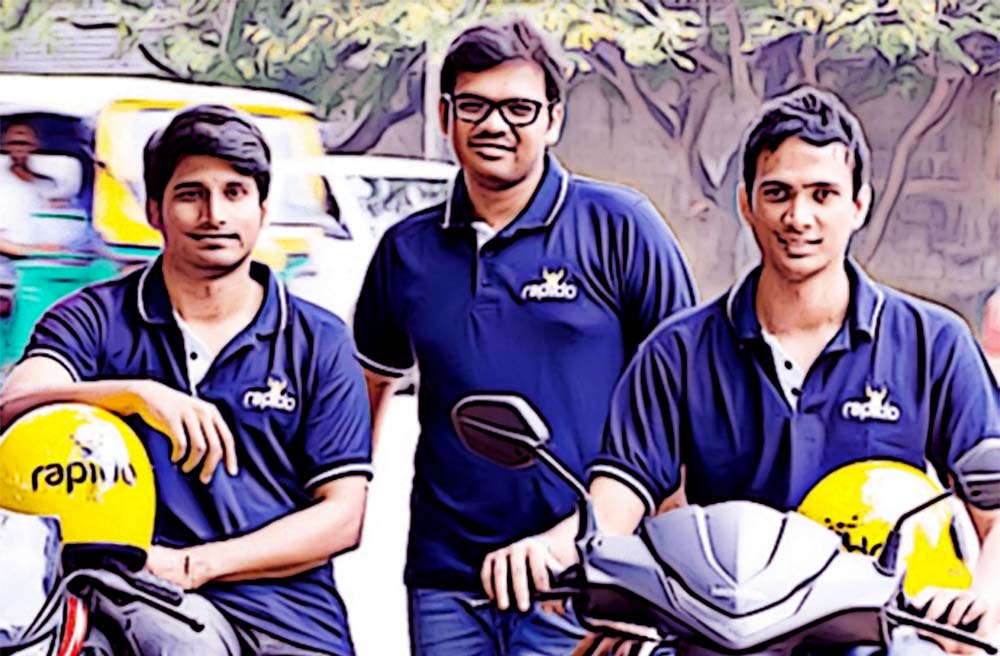Do you also envy those two-wheelers who drive right past you, paving their way through the hustle and bustle of everyday markets, hour-long processions and unavoidable traffic jams, while you are stuck in your luxurious four-wheeler not being able to move even an inch? Well, that’s where Rapido comes in and that too at the touch of a finger. What initially started as a mere IIT alumni project, is now a full-fledged “ride solo” sloganed, online, two-wheeler taxi service aggregator and provider, based out of Bangalore, India.
Founded in the year 2015, the white, black and yellow coloured Rapido now operates in over 100 cities across the country.
Brains That Birthed the Idea
Aravind Sanka, Pavan Guntupalli, and SR Rishikesh initially founded ‘the Karrier’ in 2015 as an IIT alumni project. While Sanka, an alumnus of IIT Bhubaneswar, previously worked as the Finance Business Partner for Flipkart.com, Guntupalli pursued his degree from IIT Kharagpur. A former software developer with Samsung Research India. Rishikesh, on the other hand, pursued his education at PES University. The founder of IMP Stant and the Karrier has also received the “Best Project of the Year” award for his innovative ideas and their polished execution.
The three founders’ simple idea behind the startup was to recruit people who owned two-wheelers in particular. They wanted to create something different and unique in comparison to the already existing idea of an online taxi service provider, such as that of Ola and Uber, who heavily invest in four-wheelers. The trio believed that those who owned two-wheelers would only be required to register on the ‘Rapido-Captain App’ and verify their information with the company, thereby making the entire process easy and hassle-free.
The founders identified a problem and in that, a business opportunity. Traffic in major cities of the country is an issue that one cannot simply overlook; and Ola and Uber would therefore never be easily and readily available to the general commuters, especially on a regular basis. They then devised a strategy to solve such issues and built on a blueprint that would provide for convenient, memorable and economical two-wheeler rides.
Rapido and the Mechanism behind the Name
The Rapido app allows its users to book a trip and a rider, also called the “Captain”, who will then arrive at the specified venue. The fare includes a base fare of Rs. 15 as well as an extra charge of Rs. 3 per kilometre travelled. The “Captains” are compulsorily required to register through the ‘Rapido-Captain App’ and upload the necessary documentation which the company will then validate. All kinds of two-wheelers, including motorcycles, scooters and e-bikes are permitted, provided the vehicle is not older than 2010.
‘‘
Rapido has had over 15,000 registered users since its launch, with an estimated 30,000 journeys every day. Not only has the startup created over 500,000 jobs in India, but it also claims to have over one crore registered users as of November 2019.
The Success Milestones
Rapido, ever since its inception, has over 15,000 registered users, with an estimate of 30,000 rides in a day. Additionally, Hero MotoCorp Chairman Pawan Munjal and former Google India Head Rajan Anandan are among those who have stakes in the company.
According to Aravind Sanka, 60 per cent of working people switch between three modes of transportation on a regular basis while commuting. The founders, therefore, needed something that is dependable, convenient and inexpensive for ordinary people to drive short distances. This led to a tagline that resonates with a daily commuter – ‘ride solo’.
The firm has generated more than 500,000 jobs in India, has about 15 lakh ride partners and one crore registered users as of November 2019.
The team realised it needed to create a unique product that centred on asset efficiency, utilisation, operations and transportation, with a particular emphasis on Tier II and III cities. This was the main priority when building and developing a robust product.
How in the Time of Covid-19, Rapido Won Our Hearts
Post the outbreak of the Covid-19 pandemic, Rapido further extended its logistics activities. It initiated the delivery of hyperlocal shipping for local enterprises and e-commerce firms. Rapido also began offering on-demand auto-rickshaw services in 14 cities in October 2020.
When Prime Minister Narendra Modi pronounced a pan-India 21-day lockdown in the wake of the coronavirus pandemic, the start-up confirmed it had temporarily halted operations. However, later the company decided to join hands with Bigbasket, Big Bazaar and Spencer’s Retail to assist in supplying necessities in such unprecedented times.
Around 70 per cent of Rapido’s rider partners were on the field helping with the essential supplies. To protect its rider partners from the deadly coronavirus, the start-up had undertaken all the necessary steps and precautions. Additionally, Rapido provides a Rs 10 lakh community protection policy to its riders to protect them from financial hardship in the event of hospitalisation due to COVID-19.
Rapido is currently in talks with a number of players, including Grofers, Dunzo, FreshtoHome, and others, about expanding their assistance to help them deliver critical orders. In these uncertain and undetermined times, the startup has left no stone unturned to provide assistance to those in dire need to help. Rapido even announced that it would not charge its rider partners any commissions for trips taken to transport important goods.
Moreover, to ensure more protection in the middle of the pandemic, the team recently launched Rapido Safety Shield, a first-of-its-kind safety measure by a bike taxi player in India.
The Rapido Safety Shield is a lightweight PVC board that is fixed to the Captain’s back like a backpack and weighs about 400 gms. The Captain’s body is shielded by the shield, which creates a barrier between the passenger and the Captain. The team believed that this, in addition to other protective initiatives such as gloves, sanitisers and the Aarogya Setu App would improve safety.
How Rapido Thrives in a Market Brimming with Cut-Throat Competition
Over the years, Rapido has been successful in attracting new competition in the market; namely, RideAmigos, GoKid, Vollo and GrabTaxi. While RideAmigos’ top priority being transportation, the company also manages mobility, offers simultaneous services pertaining to travel planning, ride monitoring and subsequent gamification; as a carpooling app for kids, GoKid organizes kid’s carpools and aims to reduce noise and pollution. Vollo, on the other hand, is a comparatively new startup that allows users to browse for buses, fly quickly and easily, and also book tickets.
The three Rapido founders, Aravind Sanke, Rishikesh SR, and Pavan Guntupal, bet heavily on the mobility domain, and the startup was able to thrive and expand despite the regulatory competitive wrangling in the market.
‘‘
Rapido has seen a host of challenges in terms of the legality of its activities in various cities due to regulatory restrictions, but has since overcome them due to savvy business models and clever pivoting.
The Secret Behind the Success
From the onset, the startup made it a point to cater to the concerns of customers and ‘Captains’ in order to improve facilities.
They realised that consumers were willing to wait for a lift, and therefore they added a snooze button to the system. If a customer is unable to locate a bus, pressing this button causes the app to search for a Captain in the area for 10 minutes.
In the second year, the team found that many users who used the service on a daily basis were used to a pass scheme. As a result, the Rapido Pass was launched. The passengers who opt for an ‘x’ number of journeys per month are offered each ride at a reduced rate.
Rapido makes it a point that they would continue adding features to the app guided by the evolving and never-ending demands of consumers. The company has a history of prioritising customer satisfaction by building on their needs and this has been a major secret behind the startup’s success.

Setbacks on the Way
Rapido has encountered a few setbacks in terms of the legalities of its operations in a number of cities. Several Rapido bikes were confiscated in Coimbatore in October 2018. Rapido’s activities were suspended throughout Tamil Nadu by the Madras High Court in July 2019 and the Rapido iOS app was also deleted from the App Store for violating local rules.
The court however lifted the ban in August 2019, allowing the company to restart operations in the state before new rules for bike taxi services were drafted by the state government. According to sources, the provisional orders were withdrawn after Rapido clarified the process for booking bikes via the app to the judges and confirmed that they were following all the required safety precautions, such as requiring cyclists to wear helmets and have valid insurance. The court further inquired as to when the Tamil Nadu government would file appropriate legislation for bike-sharing systems, similar to those enacted in other states such as Telangana, Rajasthan, and Chandigarh.
What’s Next for Rapido?
The start-up business is quickly expanding. The company’s financials reflect its expansion in the near future. In the previous year, the Bengaluru-based corporation announced a 12.5X increase in sales. Interest income and capital gains from mutual fund sales were also received by the firm. Although its aim is to reach a million customers every day, it is important to note that 5,00,000 captains have already served 10 million customers in 90 locations.
Rapido had received an initial and fresh funding round of Rs. 390 crores led by Westbridge Capital, Nexus Venture, among such others; and this played an instrumental role in making the company what it is today. However, this is just the beginning. The company hopes to expand its offerings to over a hundred cities and reach a daily trip volume of one million. The company’s objective is to add more new features to the app, making it more effective and user-friendly. The founders are considering lowering the fees by offering a model that would be subscription-based and provide a power pass to their existing customers.
As the company continues to maintain its leading role in the bike taxi industry across cities, their aim is to not only reduce the cost of the rides but also instill brand loyalty in the customers by providing a reliable, convenient and memorable riding experience.




